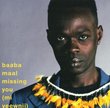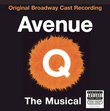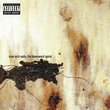| All Artists: Matthias Goerne, Franz [Vienna] Schubert, Ludwig van Beethoven, Recorded Sound, Alfred Brendel Title: Schubert: Schwanengesang; Beethoven: An die Ferne Geliebte Members Wishing: 0 Total Copies: 0 Label: Decca Release Date: 5/10/2005 Genres: Special Interest, Pop, Classical Styles: Vocal Pop, Opera & Classical Vocal, Chamber Music, Historical Periods, Classical (c.1770-1830) Number of Discs: 1 SwapaCD Credits: 1 UPC: 028947560111 |
Search - Matthias Goerne, Franz [Vienna] Schubert, Ludwig van Beethoven :: Schubert: Schwanengesang; Beethoven: An die Ferne Geliebte
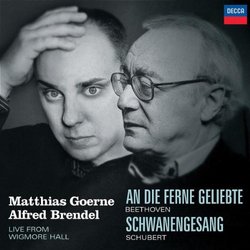 | Matthias Goerne, Franz [Vienna] Schubert, Ludwig van Beethoven Schubert: Schwanengesang; Beethoven: An die Ferne Geliebte Genres: Special Interest, Pop, Classical
|
Larger Image |
CD DetailsSimilarly Requested CDs
|
CD ReviewsA mixed success that you may like Larry VanDeSande | Mason, Michigan United States | 06/07/2005 (3 out of 5 stars) "Matthias Goerne's career took off like a skyrocket in the late 1990s fueled by his 1997 CD of Schubert lieder by Goethe. Critics on both sides of the Atlantic hailed his chocolate bass-baritone and legato with timbre most hadn't heard since Hans Hotter. Goerne's critical success continued with CDs of Wolf lieder, Mahler, opera and Bach (including the baritone cantatas) before coming back to Schubert early in this century. While those CDs continued to do well at the cash register, the critical reaction on his new Schubert was mixed. If critics in England liked his performances, critics in America did not and vice versa. The reason for these split decisions was an emerging trend by Goerne to overinterpret the music and to sing piano sequences in a whisper and the forte crescendos in a thunder. The same criticisms (or adulation, depending on your point of view) can be applied to this CD, a concert recording of Beethoven's song cycle "An Die Ferne Geliebte" and Schubert's "Schwanengesang". In my opinion, the Beethoven is a failed effort and the Schubert is better but still fraught with the errors of Goerne's ways he has shown in recordings most of the past 3-4 years. Right from the onset, the Beethoven displays none of the impetuousity and passionate fervor we would expect from this composer at Op. 90. Instead, it is performed by Goerne (with sensitive accompaniment by Brendel) as if it were Op. 125. To me, it is more Mahler than Beethoven, more wayfarer songs than songs of a lost love far away. The pair take the opening sequence, "Auf dem Hugel sitz ich", in a slow march. This barely changes until the fourth stanza, where they finally pick up the pace and the passion. By the time Goerne arrives at track six, "Diese Wolken in den Hohen", the music is so distended it is cleary more Mahler than Beethoven. It is only in the final closing moments where Goerne displays the passion and verve we expect from Beethoven, longing over a lost beloved on a hilltop. Compared to Stephan Genz's spectacular cycle and Thomas Allen's concert recording from a few years back (unfortunately deleted in USA) Goerne's performance simply won't do. It is too slow and syrupy to be effective Beethoven. The Wigmore Hall audience understood this and gave the pair only lukewarm applause afterward. The Schubert comes off much better although Goerne continues to display the same disturbing mannerisms in this music, which I have heard to much better effect by baritones with smaller, more lithe voices including Holzmair. Goerne gets more in the spirit of Schubert right away by displaying passion in the opening song of the cycle, "Liebesbotschaft". Yet, throughout the cycle, he displays the same Mahleresque tendencies to elongate phrases, whisper soft text and explode into fortissimo, as if he sensed his audience was falling asleep. The opening subject of "In der ferne" is distended and operatic, although Goerne improves later on. In fairness, he can be very effective when the text calls for such a dramatic reading. Witness "Ihr bild", a sad and dreamy song where Goerne's delivery is eerily sensitive to the text. However, Goerne returns to the one size fits all approach in the popular "Abschied", where he lacks the spontaneity and fun I've heard from singers including Holzmair. Goerne and Brendel are frankly straightforward and dull in this, one of Schubert's most ironic songs about both loss and happiness. A great curiosity to me is the way the audience explodes into applause at the end of "Der Doppelganger" which not only creeps along like a worm on a dry sidewalk...it is not the end of the cycle! As if an encore, Goerne's closing "Die Taubenpost" is stodgy and dull compared to Holzmair, whose performance (at the beginnig of his CD) is one of the most successful parts of his cycle. For his part, Alfrend Brendel provides world class accompaniment to these songs. He is neither competitive nor cantankerous and always shows his trademark intelliegence and sensitivity. Unfortunately, he is on board with Georne's tendency to overinterpret and helps deliver two cycles more akin to Mahler than the composers. If your taste runs to singers with gigantic voices who have very individiualistic ideas of music -- accompanied by the most stalwart pianists -- then you may love this CD. Goerne's big voice, outstanding diction and magnificent span from mezzopiano to fortissimo is always apparent in DDD sound (a bit bottom heavy, perhaps) captured during a concert in London. This should have been aprescription for success. Instead, it is only partially successful, in my opinion." Gramophone CD of the Month Haroot Avanesian | La Crescenta, CA United States | 06/17/2005 (5 out of 5 stars) "I heard this recording last night and was blown away by its power and beauty. I am somewhat puzzled by other reviewers giving it a mere three star rating. Gramophone magazine's review begins with: "Wonderful, powerful music-making from this peerless Lieder partnership" and continues with..."Goerne and Brendel form one of the great Lieder partnerships of the day. The sympathy between them goes beyond skilful ensemble, and beyond shared enjoyment of the wealth of illustration in Schubert, into a deep understanding of the poetry as he composed it". Don't miss it." Brendel and Goerne and Sublime Beethoven and Schubert Grady Harp | Los Angeles, CA United States | 08/27/2005 (5 out of 5 stars) "Some collaborations between singer and pianist reach the summit of perfection and fortunately this recording from a live performance in London's Wigmore Hall captures one of those rare moments in musical history when everything about the music simply falls in to place. This may seem like gushing praise for a CD: there are some technical problems with recording a recital before a live audience that challenge even the finest equipment and professionals at the controls. But forgive some of the sonic flaws and what is recorded is a blissful rendering of Beethoven's "An die ferne Geliebte" and Schubert's "Schwanengesang".
Matthias Goerne owns a voice of gold and intelligence to match and his reputation as a lieder recitalist is well earned. His phrasing, breath control, dynamics and luxury of tone are becoming legendary. He knows how to use his instrument and in this recital he is in peak form. The relative surprise comes from the authoritative and noble pianism of Alfred Brendel who brings his long years of specializing in the works of Beethoven and Schubert to this collaboration, becoming more the mastermind of the architecture of the works, honoring Goerne's contributions with fastidious yet passionate support. This recording is one to own and watch, as it surely will enter the ranks of awards for excellence. It is a joy. Highly recommended. Grady Harp, August 05" |

 Track Listings (25) - Disc #1
Track Listings (25) - Disc #1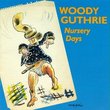
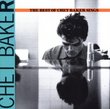
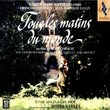
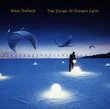

![Seussical [2000 Original Broadway Cast]](https://nationalbookswap.com/cd//m/02/4802/514802.jpg)
